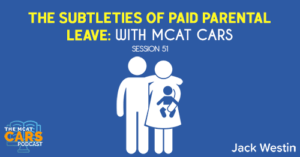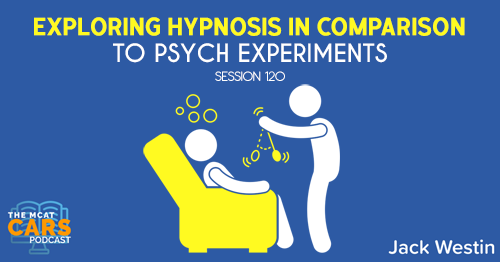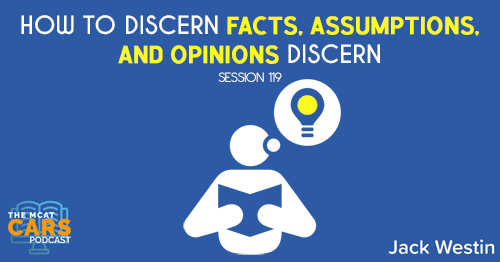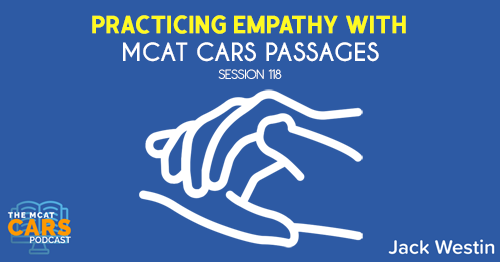Apple Podcasts | Google Podcasts

Session 51
Are you ever actually ready for the MCAT? Jack Westin joins me to reveal his answer to the question, plus a challenging passage on parental leave policies.
Listen to this podcast episode with the player above, or keep reading for the highlights and takeaway points.
Link to article:
I’m an economist. I love data and evidence. I love them so much that I write books about data-based parenting. When questions arise about how to support parents at work (for example, from Alexandria Ocasio-Cortez on Twitter), my first impulse is to endorse paid parental leave. Mountains of data and evidence show that paid leave is good for children’s health, and for mothers in particular. I am more than comfortable making a data-based case for this policy.
But experience, rather than pure data, leads me to believe that what happens after paid leave is nearly as crucial—that is to say, what happens when Mom and Dad return to the office. We need to normalize the experience of parenting while working.
For the past few weeks, I’ve been talking with parents—mostly women—about all aspects of life with little kids. (My new book, Cribsheet, focuses on using data to make parenting decisions.) One thing I heard much more than I would have liked, and more than I would have expected, was that parents feel the need to hide or minimize the evidence of their children at the office.
I should be clear that most of the parents I spoke with had good—enviable, lengthy, gender-neutral—leave policies. The issues they encountered were more subtle, more nebulous, more about climate.
Women told me that they hid their pregnancies until well into the third trimester, wearing loose-fitting clothes to avoid telling their bosses or venture-capital funders that they were expecting. Once they had kids, some told me they simply never discussed them. If they had to deal with a child-related issue, they lied about why they were leaving work.
[02:06] University Exam vs The MCAT
Realize that the MCAT is not a university exam where you can potentially get 100% on every test you take. This is primarily because of the time factor. Usually, the teacher gives you a lot of time to think through it. You either know it or you don’t know it. This leads to a pretty good curve. There are students who do really well and there are those that don’t because they didn’t study.
But on the MCAT, you can’t get that extra time. Everyone has an equal amount of time to look at every question. Master the timer. If you can figure that out, you’re going to do really, really well.
'The thing that makes it difficult is the timer. You feel like you can finish it and you can do well but you just don't have time.'Click To TweetYou can’t get every question right. It’s almost impossible on the MCAT. The odds are very low. And even the students who are getting the 100th percentile are still missing a question or two. So you can’t think you have to be a perfectionist. And this is a difficult transition that students have to make.
[04:20] How to Beat the MCAT
Focus on the easy questions. You have to get the easy questions right. When you know a question is easy or hard depends on the student. It depends on the mood and how well they’re reading at the moment.
'It's not about getting every question right but getting the EASY questions right.'Click To TweetIf you have a hard time on the question, the worst thing you can do is stick to that question. Every question is equally weighted and it’s worth the same amount of points. So if you’re spending way too much time on one question that’s worth one point, for instance, you’re basically sacrificing the other questions that could potentially be easier.
It’s not about having a perfect score. The student that gets the most questions right within the amount of time ends up with a higher score. So get the easy questions out of the way. Skip or wait on those harder ones and come back to them.
The general rule of thumb is if you’re spending more than a minute on a question, you’re basically guessing. You’re going towards a guess so you might as well just let it go.
[06:28] When Should You Sign Up?
You know you can sign up for the exam when you know in a month or two that you’re ready.
Don’t worry about testing centers getting full. Almost every single test center opens up the last minute because students over anticipate when they’re going to take the test. They cancel it and reschedule it. They just decide they’re not ready. So you’ll save a ton of money.
'There will always be spots available as long as you're patient.'Click To TweetSome students like to sign up earlier because it forces them to study. They feel like they have a goal. This is a terrible reason to sign up. If you can’t motivate yourself to study or have the determination to take the test at a certain day or time period, Jack doubts that signing up with do that.
Sign up a month or two in advance. But if you sign up five to six months in advance could be pushing it. Wait until you feel like you’re ready.
Back to our article today…
[09:55] Paragraph 1, Sentences 1-2
I’m an economist. I love data and evidence.
Jack says:
The writer is an economist and loves data-based evidence.
[10:05] Paragraph 1, Sentence 3
I love them so much that I write books about data-based parenting.
Jack says:
They write books about data-based parenting.
[10:22] Paragraph 1, Sentence 4
When questions arise about how to support parents at work (for example, from Alexandria Ocasio-Cortez on Twitter), my first impulse is to endorse paid parental leave.
Jack says:
We have this point of view about paid parental leave. Visualize what is paid parental leave is. Parents are getting paid to leave.
Keep an open mind. If you know you’re on a new topic, visualize it. Try to sense what’s going on. But if you don’t really have any idea what’s going on, then definitely keep reading.
[12:02] Paragraph 1, Sentence 5
Mountains of data and evidence show that paid leave is good for children’s health, and for mothers in particular.
Jack says:
Now, the writer is saying there’s a lot of evidence to support this paid parental leave.
[12:22] Paragraph 1, Sentence 6
I am more than comfortable making a data-based case for this policy.
Jack says:
The author is saying we should make this policy of more paid parental leave.
The big picture of this paragraph is that paid parental leave is good. It’s particularly focused on the mother.
[13:20] Paragraph 2, Sentence 1
But experience, rather than pure data, leads me to believe that what happens after paid leave is nearly as crucial—that is to say, what happens when Mom and Dad return to the office.
Jack says:
The author is saying that we know that paid leave is good but what happens afterward is nearly as crucial as the paid leave itself.
We really don’t know if they’re referring to the children’s wellbeing. So it’s just another way of saying, “this is what I mean.” It’s what happens to mom and dad when they return to the office.
It’s not referring to the wellbeing of the mom and dad outside of the home but it’s referring to the parents back at work.
[14:44] Paragraph 2, Sentence 2
We need to normalize the experience of parenting while working.
Jack says:
This perspective is coming from the author. It comes off very strong. So you need to understand that if the author cares about something, they will say it in a very direct manner. It’s a very forward opinion. By “normalize” means to make it accepted.
The big picture of this paragraph is that parents need the paid leave and we need to make sure that the transition back to work is also good.
[16:11] Paragraph 3, Sentence 1
For the past few weeks, I’ve been talking with parents—mostly women—about all aspects of life with little kids.
Jack says:
The author is talking about the research they’re doing, talking to parents.
[16:25] Paragraph 3, Sentence 2
(My new book, Cribsheet, focuses on using data to make parenting decisions.)
Jack says:
It’s a little plug for the author’s book.
[16:36] Paragraph 3, Sentence 3
One thing I heard much more than I would have liked, and more than I would have expected, was that parents feel the need to hide or minimize the evidence of their children at the office.
Jack says:
The author is saying that parents feel like they need to hide the fact that they have kids. The author’s opinion is to normalize parenting at work. But then the author describes the actual problem.
As a reader, you have to realize that the second paragraph is the solution and the third paragraph is the actual problem. So we have to superimpose the second paragraph to the third paragraph.
In order for you to figure this out, you have to know the author’s point of view. Otherwise, it can be confusing. The key was the word “we” in the second paragraph. This gives the opinion of the author so you really need to stick with that.
[19:18] Paragraph 4, Sentence 1
I should be clear that most of the parents I spoke with had good—enviable, lengthy, gender-neutral—leave policies.
Jack says:
The author says that there are good policies going on at work. These are the employers’ policies that the parents are telling the author about. So you have to figure out who’s saying what. And here, the author believes that we have to normalize it. The parents believe they’re embarrassed by the fact they have children. But it’s how ironic because the workplace is trying to make it good for their workers. Why are these parents feeling this way then?
[20:45] Paragraph 4, Sentence 2
The issues they encountered were more subtle, more nebulous, more about climate.
Jack says:
The climate here refers to the attitude of the environment, instead of the actual weather of the environment.
The big picture of this short paragraph is that even with good policies, there are still subtle problems going on here. There may be some grey areas in passages and that’s okay. It doesn’t always have to be black and white. The key is to understand how “middle” is the author.
There needs to be some level of baseline empathy to actually understand this passage. But there’s a growing number of students on the autism spectrum. One of the things that seem to be difficult for many is the empathy aspect.
This is the reason that the MCAT actually added Psychology and Sociology. This means the AAMC believes that the future of medicine is compassion.
[26:45] Paragraph 5, Sentence 1
Women told me that they hid their pregnancies until well into the third trimester, wearing loose-fitting clothes to avoid telling their bosses or venture-capital funders that they were expecting.
Jack says:
The author is explaining how the women are hiding their pregnancy. Think of this in terms of the parents. And they’re hiding the fact they have children. Why is the author bringing this back up?
[28:25] Paragraph 5, Sentence 2
Once they had kids, some told me they simply never discussed them.
Jack says:
So they hide their pregnancy and once the kids are born, it’s as if they’re not there.
[28:40] Paragraph 5, Sentence 3
If they had to deal with a child-related issue, they lied about why they were leaving work.
Jack says:
There are times when the kids can get sick and they can’t get to work. But the parents lie and they say they’re leaving from work for another reason.
[29:24] Final Thoughts
Find interest in what you’re reading. You may not know a single thing about paid parental leave. But there’s a deeper angle that you may not care about but you may find some compassion for.
'Have the ability to understand the author's points of view.'Click To TweetIn answering questions, focus on the writer’s main idea. Focus on the author’s opinion. So it’s not just reading and looking at words. You have to connect with the author and understand where they’re coming from.
This goes back to the discussion on the “grey area.” It doesn’t have to be right or wrong. Just know what level that is.
Links:
Link to article:
SEARCH SITE
SEARCH SITE
LISTEN FOR FREE











